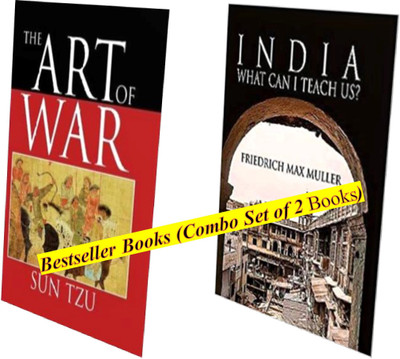The Art Of War & India What Can I Teach Us (Combo Set Of 2 Bestseller Books)(Hardcover, Sun Tzu & Fredrich Max Muller)
Quick Overview
Product Price Comparison
"The Art of War" remains on of the world's most famous military texts, 2,500 years after it was published by Sun Tze an adviser who probably lived during the Spring and Autumn Period (776-471 BCE). However, it is now celebrated by today's business gurus and even sports coaches as guidance for dealing with conflict of all sorts. When Snapchat CEO Evan Spiegel felt threatened by the encroachment of Facebook into Snapchat's market, he gave each of his team members a copy of "The Art of War" in order to have them think in terms of ruthlessness competition. Whether it is internal or external to an organization or an individual's battles with themselves, competitors, or nature, "The Art of War" gives comprehensive advice on how to approach conflict. Let's take a look at 10 life lessons that can be taken from this broadly universal work. The 13 chapters of The Art of War, each devoted to one aspect of warfare, were compiled by the high-ranking Chinese military general, strategist, and philosopher Sun-Tzu. In spite of its battlefield specificity, The Art of War has found new life in the modern age, with leaders in fields as wide and far-reaching as world politics, human psychology, and corporate strategy finding valuable insight in its timeworn words. The Art of War is a book which should be used to gain advantage of opponents in the boardroom and battlefield alike."India What can It Teach Us" This work has been selected by scholars as being culturally important, and is part of the knowledge base of civilization as we know it. A collection of the lectures of Max Muller, India: What it Can Teach Us portrays India, especially Vedic India, as an epitome of virtue and morality, whose glory is equal to classical Greek and Roman thought. Muller, in these essays, urges the West to abandon their superior colonial mind-set to adopt the multi-dimensional efficacy that is inherent to Indian culture. Some of the most valuable and instructive materials in the history of man are treasured up in India, and in India only. In her classic dialect, the Sanskrit, we may read with what success ancient India conquered the elements and the world as it was then known. This book gives the reader some idea of ancient India, of its ancient literature, and, more particularly, of its ancient religion. Muller will help you see and feel what it was like in ancient India, and the importance that it played in the history of the human race.


